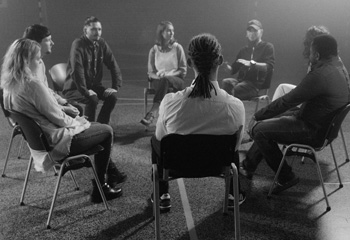By Kyle Sorys

“Go forth, for the benefit and happiness of humanity, out of compassion for the world… Proclaim the Teaching that is good in the beginning, good in the middle, and good in the end, that has a true goal and is well articulated.”
— Vinaya Piṭaka, Mahākhandhaka 1.8
When people think about Buddhist practice, they often imagine silent meditation halls, incense-filled temples, or peaceful retreat centers. Few picture a jail unit where incarcerated men and women gather in a fluorescent-lit room, learning how to be present with their breath and their own thoughts. But this is where the Begin Again program sees mindfulness as most needed and where it can make a difference. Launched in January 2019, the program’s mission is simple: to bring mindfulness practice to underserved populations. This year, Begin Again celebrates five years of offering incarcerated individuals the practice of mindfulness and meditation.
The Buddha’s encouragement to “go forth for the benefit and happiness of humanity” speaks directly to the compassionate core of the Begin Again program, reaching out to those behind bars with a message of healing and transformation. Just as the Buddha’s teachings offer a path toward liberation, Begin Again provides incarcerated individuals the opportunity to “begin again” in each moment, both in and out of jail.
The mindfulness practices taught are “good in the beginning, good in the middle, and good in the end.” They offer a clear and practical approach to breaking cycles of reactivity and finding inner calm, no matter the circumstances.
Incarceration is more than just physical confinement; for many, it is a prison of the mind. Anger, regret, trauma, and hopelessness weigh heavily on those serving time. Many have spent years in survival mode, reacting to external circumstances rather than responding with clarity and wisdom. Mindfulness offers a different path. It encourages participants to pause, observe, and choose how to engage with compassionate awareness.
During the four-week program, participants explore mindfulness meditation, emotional intelligence, mindful relationships, and gratitude. By the end of the course, many share reflections like, “I’m less reactive now, I don’t dwell on the past or future as much, and I feel more peace and acceptance in my everyday life.”
Learning to sit with discomfort instead of reacting out of impulsive habits can mean the difference between reentering society and returning to jail.
The ultimate goal of the Begin Again program is not just personal healing but also integration — helping individuals return to their communities with greater self-awareness, stability, and hope. Each four-week session concludes with a reminder that mindfulness is not just a class exercise but an ongoing practice. The skills learned in the program can extend beyond the prison walls and into daily life. The transformative power of mindfulness provides a lasting opportunity for change. It helps participants break free from the mental prisons that have held them for so long. Even within the walls of a jail, freedom is possible — the freedom to respond thoughtfully, to meet suffering with compassion, and to begin again, one breath at a time.
To learn more, visit https://www.flatwatercollective.org/
This article is the second in a new series highlighting Engaged Buddhism. We would love to hear about how your sangha is taking practice off the cushion and into the community. If you would like to tell us your story for a future newsletter, please contact us.
Kyle Sorys began practicing mindfulness in 2008. He has a Bachelors degree in Contemplative Psychology and a Master of Divinity from Naropa University. He is an interfaith chaplain at APUS University and Care Initiatives Hospice in Omaha, NE. He also teaches mindfulness meditation for the Begin Again program at Douglas County Corrections. He is a member of the board of Directors of Mid America Dharma.